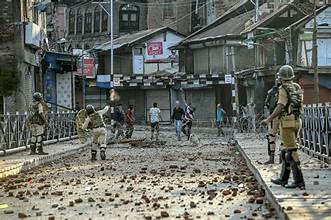Pakistan Responds to India’s Suspension of Water Sharing Treaty
Escalating Crisis Between India and Pakistan: Diplomatic Relations at Lowest Point
On April 24, 2025, Pakistan escalated tensions with India by closing its airspace to Indian airlines and suspending trade, following India’s suspension of the Indus Waters Treaty. This move came as a direct response to a deadly militant attack in Indian Kashmir, which led to the tragic deaths of 26 civilians. The bilateral relationship between these two nuclear-powered nations, who have fought three wars in the past, plunged to new depths as both nations engaged in retaliatory measures.
India’s Suspension of Indus Waters Treaty Triggers Pakistani Response
The Indus Waters Treaty, a 1960 agreement that governs the sharing of water between India and Pakistan, is now at the center of a major diplomatic standoff. India’s decision to suspend the treaty has been viewed by Pakistan as an act of war, particularly because Pakistan is highly dependent on the Indus River for its irrigation and hydropower needs. The suspension of the treaty would allow India to control Pakistan’s water supply, a move that has been deemed unacceptable by Islamabad.
Pakistan’s Prime Minister has stated that any action to disrupt the flow of water would be met with full force, warning India that this could escalate into broader hostilities. Pakistan has also threatened to freeze all bilateral agreements, including the Simla Agreement of 1972, until India ceases its alleged involvement in fostering terrorism within Pakistan’s borders.
Pakistan Takes Aggressive Measures in Response to Terrorist Attack
The diplomatic row was ignited by the Islamist militant attack on tourists in the Pahalgam region of Kashmir on April 22, which claimed the lives of 26 individuals. In the aftermath, India’s Prime Minister Narendra Modi vowed to track and punish the militants responsible for the attack. India also suspended visa services for Pakistani nationals and revoked previously issued visas, further complicating the already tense diplomatic situation.
In retaliation, Pakistan closed its airspace to Indian airlines and suspended all trade, including via third-party nations. The economic impact was immediately felt, with Pakistan’s government bonds dropping over 4 cents as investor sentiment worsened amidst the escalating tensions.
Modi’s Vow to Punish Attackers Adds Fuel to Fire
Indian Prime Minister Narendra Modi has taken a firm stance, declaring that the perpetrators of the deadly Kashmir attack will be pursued and punished. He vowed to track the attackers “to the ends of the earth,” though he refrained from directly implicating Pakistan in the attack. Modi’s rhetoric, however, has been accompanied by widespread public protests in India, including protests outside the Pakistani embassy, intensifying the already strained relations between the two countries.
Modi’s strong words have garnered national support, especially from his Bharatiya Janata Party (BJP), which has positioned the abrogation of Kashmir’s special status as a significant achievement. However, the recent attack has proven to be a setback for the Hindu nationalist government‘s efforts to bring peace and stability to the disputed Kashmir region.
Diplomatic Fallout and Continued Tensions in Kashmir
The Kashmir conflict remains a flashpoint between India and Pakistan, with both countries claiming the region in full but each controlling only parts of it. Over the years, tensions have led to several wars and skirmishes, and despite recent efforts to stabilize the situation, the region remains volatile. Tourism has surged in the area, yet the violence and ongoing militancy persist, undermining efforts to bring peace to the region.
Pakistan’s actions are seen as part of a broader strategy to resist India’s influence and actions in the region. With both countries accusing each other of provoking violence, the situation in Kashmir continues to be a significant point of contention.
Economic and Strategic Implications of the Crisis
As diplomatic relations between India and Pakistan sour, Pakistan’s economy has taken a hit. The country’s bonds saw a steep decline, signaling the broader economic consequences of this deteriorating diplomatic crisis. Both nations stand at a crossroads, with escalating tensions threatening to undermine regional security and economic stability.
Conclusion: The Path Forward
The closure of airspace, suspension of trade, and the suspension of the Indus Waters Treaty mark a critical moment in the ongoing tensions between India and Pakistan. As both countries dig in their heels, the likelihood of further escalation remains high. Global attention will remain focused on the Kashmir conflict, as the international community calls for diplomatic dialogue and a peaceful resolution to the longstanding dispute.
Key Takeaways:
- Pakistan has closed airspace and suspended trade in response to India’s suspension of the Indus Waters Treaty.
- India’s Indus Waters Treaty suspension is seen by Pakistan as an act of war.
- India’s Prime Minister Modi pledges severe retaliation against the perpetrators of the Kashmir attack.
- Economic instability is evident, with Pakistan’s government bonds dropping significantly.
- Diplomatic relations between India and Pakistan are at a historic low, with Kashmir remaining a core issue.
As tensions continue to rise, the situation remains precarious, with both nations on edge and the future of the Indus Waters Treaty hanging in the balance.





















